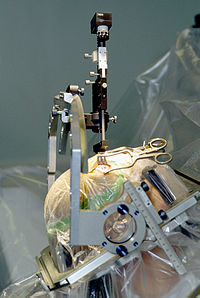
Photo from wikipedia
OBJECTIVE Patients with epilepsy who do not respond to two trials of appropriate antiepileptic drugs are considered to have drug-resistant epilepsy (DRE). The International League Against Epilepsy recommends patients with… Click to show full abstract
OBJECTIVE Patients with epilepsy who do not respond to two trials of appropriate antiepileptic drugs are considered to have drug-resistant epilepsy (DRE). The International League Against Epilepsy recommends patients with DRE be referred for surgical evaluation; however, prior literature suggests this is an underutilized intervention, especially in the pediatric setting. This study captures practices of North American pediatric neurologists regarding the management of DRE and factors that may promote or limit referrals for epilepsy surgical evaluation. METHODS A REDCap survey was distributed via the Child Neurology Society mailing list to pediatric neurologists practicing in North America. Ethics approval from the Children's Hospital of Eastern Ontario Research Ethics Board was granted prior to the start of data collection. RESULTS Ninety-eight responses were included in the analysis; 77% of participants currently practice in the United States; 73.5% of respondents reported they would refer a patient for surgical consultation after two failed medications. Of all potential predictors tested in a binary logistic regression model, only annual referral volume predicted whether participants refer patients after three or more failed medications. Centers with high referral volume were 37% more likely to adhere to the guideline of referral after two failed medications. SIGNIFICANCE Pediatric neurologists demonstrate fair knowledge of formal recommendations to refer patients for surgical evaluation after two failed medication trials, although referral rates remain unacceptably low. Participants continue to report that they would not refer patients with generalized electroencephalographic findings for surgical evaluation; this should continue to be addressed. Other modifiable factors reported, especially family perceptions of epilepsy surgery, should be prioritized when developing tools to enhance effective referrals and increase utilization of epilepsy surgery in the management of pediatric DRE.
Journal Title: Epilepsia
Year Published: 2021
Link to full text (if available)
Share on Social Media: Sign Up to like & get
recommendations!